The Year of Reading Proust discussion

This topic is about
Time Regained
Time Regained, vol. 7
>
Through Sunday, 1 Dec.: Time Regained
message 151:
by
Kalliope
(new)
-
rated it 5 stars
Nov 28, 2013 10:36AM
 Both JoJo's and Marcelita's links with earlier parts are excellent..
Both JoJo's and Marcelita's links with earlier parts are excellent..
reply
|
flag
 Jocelyne wrote: "
Jocelyne wrote: "Don't you think that Me Verdurin in one of the most monochromatic characters? All her..."
JoJo, remember, though, how the Verdurins decided to support Saniette financially with a considerable amount and who kept complete confidentiality about it...
 Fionnuala wrote: "
Fionnuala wrote: "That is i..."
Born in Pamplona (where they run the bulls) and died (martyred) in Amiens.. The Cathedral, apart from the statue at his door, also has a polychrome relief inside.
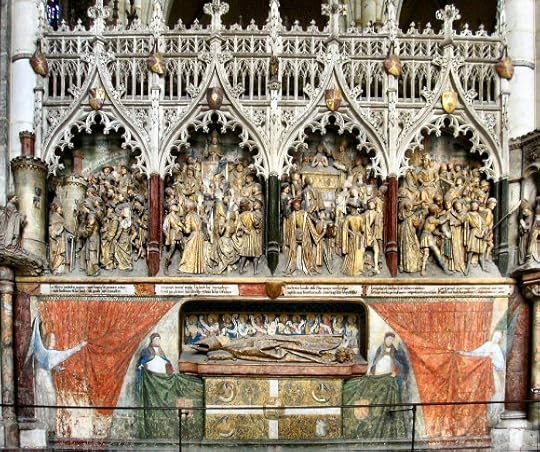
 An interesting study on Proust would be to trace closely his treatment of the sun and the moon and their derivatives...
An interesting study on Proust would be to trace closely his treatment of the sun and the moon and their derivatives...
 Kalliope wrote: "Jocelyne wrote: "
Kalliope wrote: "Jocelyne wrote: "Don't you think that Me Verdurin in one of the most monochromatic characters? All her..."
JoJo, remember, though, how the Verdurins decided to support Saniette financially with ..."
Yes, this is why it comes across as such a departure from character. Ever since that moment, I have been on the lookout for more kinder aspects of her personality maybe not in the rescuing Saniette order, but something other than mean-spirited. In vain. So far, it seems to be the only one, although I will grant you that it is quite a grand gesture.
 Jocelyne wrote: "Yes, this is why it comes across as such a departure from character. Ever since that moment, I have been on the lookout for more kinder aspects of her personality maybe not in the rescuing Saniette order, but something other than mean-spirited. In vain. So far, it seems to be the only one, although I will grant you that it is quite a grand gesture. "
Jocelyne wrote: "Yes, this is why it comes across as such a departure from character. Ever since that moment, I have been on the lookout for more kinder aspects of her personality maybe not in the rescuing Saniette order, but something other than mean-spirited. In vain. So far, it seems to be the only one, although I will grant you that it is quite a grand gesture. "Perhaps they only kept him alive to serve as their 'souffre-douleur', their whipping boy...
 Kalliope wrote: "An interesting study on Proust would be to trace closely his treatment of the sun and the moon and their derivatives..."
Kalliope wrote: "An interesting study on Proust would be to trace closely his treatment of the sun and the moon and their derivatives..."There were some great lines about the moon:
la splendeur antique inchangée d'une lune cruellement, mystérieusement sereine, qui versait aux monuments encore intacts l'inutile beauté de sa lumière
Proust dares to satirize the moon!
 Fionnuala wrote: "
Fionnuala wrote: "There were some great lines about the moon:
la splendeur a..."
I also liked this:
.. la lune étroite et recourbée comme un sequin semblait mettre le ciel parisien sous le signe oriental du croissant. p. 196.
And remember his almost subversive treatment of O Sole Mio in Venice...
Certainly his life habits, but may be in his writing, he seems more fascinated by the moon. The sun brings beauty in a less surprising sort of way.
Something to track more closely on my next read...!!!
 And the crescent moon brings us to the Orientalist painters..
And the crescent moon brings us to the Orientalist painters..He mentions Decamps, Fromentin, Ingres and Delacroix.
Karpeles gives a couple of samples from Fromentin and Delacroix.
Here is a Decamps
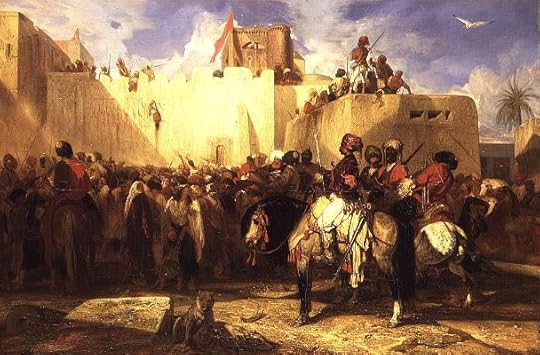
A different, and very nice, Fromentin to the one offered by Karpeles'

A Delacroix
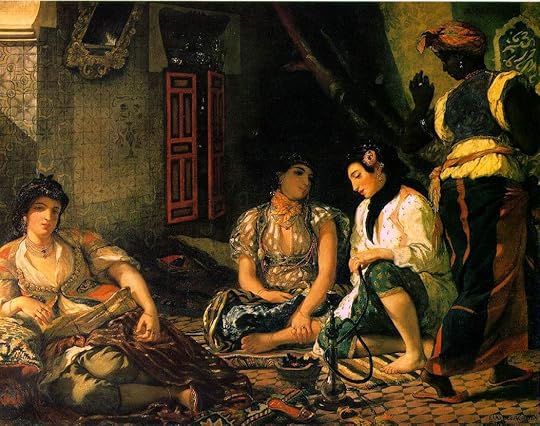
and an Odalisque -- Charlus regrets not being one himself..., by Ingres.. (the one with the impossibly long back)
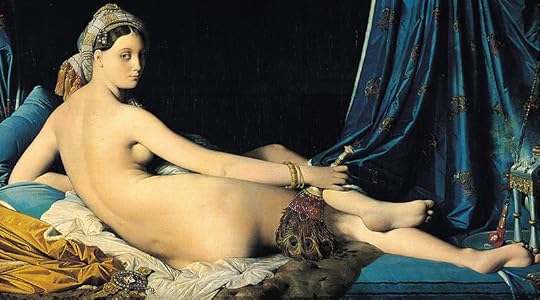
 But the Narrator prefers something more authentic, and instead of the views offered by the Western Orientalists, prefers Haroun Al Raschid from the Arabian Nights.
But the Narrator prefers something more authentic, and instead of the views offered by the Western Orientalists, prefers Haroun Al Raschid from the Arabian Nights.Me too.

 and an Odalisque -- Charlus regrets not being one himself
and an Odalisque -- Charlus regrets not being one himselfOr that the Narrator wasn't one!
That reminds me of the line, page 187, where the Narrator wonders if Charlus wouldn't like to have a pair of binoculars so that he can better examine all the opportunities surrounding him in terms of military might both on the ground and in the air! That line is really funny.
D'ailleurs M. Charlus ne savait littéralement où donner de la tête et il la levait souvent avec le regret de ne pas avoir une jumelle qui d'ailleurs ne lui eût pas servi à grand-chose
 To return to M. de Charlus: "Yes," he said, in reply to my confession that I did not quite understand. "I mean exactly what I say: 'to know,' in the articles of Norpois, indicates the future, it indicates, that is to say, the desires of Norpois, and indeed the desires of us all," he added, perhaps without complete sincerity. ML p. 136
To return to M. de Charlus: "Yes," he said, in reply to my confession that I did not quite understand. "I mean exactly what I say: 'to know,' in the articles of Norpois, indicates the future, it indicates, that is to say, the desires of Norpois, and indeed the desires of us all," he added, perhaps without complete sincerity. ML p. 136 Here we have in writing, M. de Charlus having an impression of the writings of Norpois before the Narrator, all of whom Proust has created, both the characters and their writing. Rather unusual. We have seen this before in Bergotte's writing viewed by the Narrator, Swann and others.
But Proust creates another character too, that of the reader of this and we are all different. The reader may feel and express a vulgar impression, "It's beautiful," or the reader may honor what s/he reads by a more complex and educated impression by telling you what moves him or her as in for example," The passage delights me because..." Or, on the other hand, the reader may feel it's not beautiful and expresses that it doesn't delight him or her because..., no matter whether you agree with it's beauty or not, it is personal, it is a personal impression.
You can read about how Proust appreciated the beauty of Ruskin, how he had impressions of Ruskin's sublimity and expressed what he felt creatively in Ruskin and the cathedral of lost souls by Diane R. Leonard in The Cambridge Companion to Proust, edited by Richard Bales.
For me it's not what Proust found beautiful but how he found beauty and expressed it.
 One thing leads to another on Wikipedia: Franz Joseph I, Archduke Franz Ferdinand, Causes of WW1, WWI...to understand the Narrator's walk with Charlus and to understand Proust in the war, you must understand the war first and scholars can't agree on what caused it...
One thing leads to another on Wikipedia: Franz Joseph I, Archduke Franz Ferdinand, Causes of WW1, WWI...to understand the Narrator's walk with Charlus and to understand Proust in the war, you must understand the war first and scholars can't agree on what caused it...
 Fionnuala wrote: "Ah - in the same letter, he mentions the smiling angel from Reims and suggests that it announces the Mona Lisa!
Fionnuala wrote: "Ah - in the same letter, he mentions the smiling angel from Reims and suggests that it announces the Mona Lisa!Mais celle de Reims dont le sourire semplait annociateur de celui de Vinci"
Yes, that is a wonderful reference..
These letters are more interesting than I expected.
 Kalliope wrote: "Yes, that is a wonderful reference;;."
Kalliope wrote: "Yes, that is a wonderful reference;;."There is a resemblance between the Mona Lisa's smile and the smile of that angel in Reims, isn't there?
 Fionnuala wrote: "There is a resemblance between the Mona Lisa's smile and the smile of that angel in Reims, isn't there?"
Fionnuala wrote: "There is a resemblance between the Mona Lisa's smile and the smile of that angel in Reims, isn't there?"Yes!!!, there is..!!! I thought the association was brilliant...
The Mona Lisa had been stolen from the Louvre in 1911 and was found in December 1913. So, this painting must have been recently on the French news. Apollinaire had been arrested and Picasso interrogated...!!
 Fionnuala wrote: "That was such a bizarre incident..did the truth ever come out? Was it a prank?"
Fionnuala wrote: "That was such a bizarre incident..did the truth ever come out? Was it a prank?"Yes, it was stolen by an Italian, who worked at the Louvre and who wanted the painting to be in Italy. I just read about it in 1913 - Der Sommer des Jahrhunderts.
But the story is also in this link. I had originally thought that it had disappeared only a few months, but no, about two and a half years..
http://history1900s.about.com/od/famo...
 Marcelita wrote: "Remembering the searchlights:
Marcelita wrote: "Remembering the searchlights:"Aeroplanes were still mounting like rockets to the level of the stars, and searchlights, as they quartered the sky, swept slowly across it what looked like a pale dust of stars, of errant milky ways." MP."
Even though I finished the reading a few days ago, I find mysef thinking over the passages of the bombardment which our Narrator describes in the night sky over Paris, and one in particular - the passage which leads him back to contemplating the protective power of the military that he was so aware of in Doncières, and which Kalliope quoted as an example of a horizontal thread in the weave of the Recherche.
In that passage, page 188 GF, the narrator, having commented on his own lack of fear of the 'gothas', admits that on one occasion he actually saw the trajectory of a bomb as it dropped on the city, and how the enormous reality of a danger can be concentrated into a momentary impression:
Car la réalité originale d'un danger n'est perçue que dans cette chose nouvelle, irréductible à ce qu'on sait déjà, qui s'appelle une impression, et qui est souvent, comme ce fut le cas là, résumée par la ligne, une ligne qui décrivait une intention, une ligne où il y avait la puissance latente d'un accomplissement qui la déformait, tandis que sur le pont de la Concorde, autour de l'aéroplane menaçant et traqué, et comme si s'étaient reflétées dans les nuages les fontaines des Champs-Élysées, de la place de la Concorde et des Tuilleries, les jet's d'eau lumineux des projecteurs s'infléchissaient dans le ciel, lignes pleines d'intentions aussi, d'intentions protectrices, d'hommes puissantes et sages auxquelles comme une nuit au quartier de Doncières, j'étais reconnaissent que leur force daignât prendre avec cette précision si belle la peine de veiller sur nous.
What strikes me here are the terms he uses in the description of the line of the trajectory. We have often spoken of the sinuosity of Proust's writing: a sentence begins as if moving in a particular direction before curving away, then veering back towards the point it had originally targeted. The description of the trajectory of the bomb reminds me of this painterly aspect of his writing as well as of Hogarth (eighteenth century English artist) and his theory of 'The Line of Beauty', or serpentine line, found everwhere in nature as well as in oriental art, as Proust clearly knew, and which Hogarth felt was essential to all art. If there is one thing which encapsulates Proust's writing for me, it is this concept of the 'Line of Beauty'.
 Fionnuala wrote: "That was such a bizarre incident..did the truth ever come out? Was it a prank?"
Fionnuala wrote: "That was such a bizarre incident..did the truth ever come out? Was it a prank?"I remember reading in Fernande Olivier's memoir "Loving Picasso" that Picasso and Apollinaire were terrified of being arrested and that they had some items from the museum that they dumped into the river. At least that's what I think I remember.
 ReemK10 (Paper Pills) wrote: "I remember reading in Fernande Olivier's memoir "Loving Picasso" that Picasso and Apollinaire were terrified of being arrested and that they had some items from the museum that they dumped into the river. At least that's what I think I remember. "
ReemK10 (Paper Pills) wrote: "I remember reading in Fernande Olivier's memoir "Loving Picasso" that Picasso and Apollinaire were terrified of being arrested and that they had some items from the museum that they dumped into the river. At least that's what I think I remember. "Yes, Reem - I also had some vague memory of it being a prank or statement on the part of local artists but as Kalliope points out, it was a real theft but also a statement in a way - the thief just wanted it hung in the Uffizzi back where he thought it belonged.
Here's a link about the Picasso/Apollinaire connection - you were right - there had been some stolen items stored at Apollinaire's place but not the Mona Lisa:
http://www.todayinliterature.com/stor...
 Fionnuala wrote: "Marcelita wrote: "Remembering the searchlights:
Fionnuala wrote: "Marcelita wrote: "Remembering the searchlights:"Aeroplanes were still mounting like rockets to the level of the stars, and searchlights, as they quartered the sky, swept slowly across it what look..."
I agree this is an extraordinary passage. I did not know that the Line of Beauty was a Hogarth concept.
In the Proust passage what struck me also was the word "intention", like a force.... une ligne qui décrivait une intention, and later in your quote the lignes pleines d'intentions, d'intentions prévoyantes.
A very powerful (literally) extract.
Now I also want to investigate Hogarth further...
 Fionnuala wrote: "ReemK10 (Paper Pills) wrote: "I remember reading in Fernande Olivier's memoir "Loving Picasso" that Picasso and Apollinaire were terrified of being arrested and that they had some items from the mu..."
Fionnuala wrote: "ReemK10 (Paper Pills) wrote: "I remember reading in Fernande Olivier's memoir "Loving Picasso" that Picasso and Apollinaire were terrified of being arrested and that they had some items from the mu..."I also had the memory of it being Apollinaire and Picasso.. until I read the book linked above...
The relevance for Proust, who before he began feeling ill, liked to go to the Louvre, is that the recovery of the Mona Lisa must have been in the papers one year before he made the simile between her smile and the angel from the Reims cathedral. That letter, #16 as Fionnuala spotted it, is from December 1914...
another lovely quote from that letter on the destruction of Reims and its angels (remember also those playing the theory in the Bellini and those by Giotto in the Scrovegni chapel)...
.. je crois que j'ai le droit de parler de la diminution humaine qui sera consommée le jour où s'écrouleront à jamais les voûtes déjà à demi incendiées sur ces anges qui sans se soucier du danger cueillent encore des fruits merveilleux aux feuillages stylisées et touffus de la forêt de pierres..
 Kalliope wrote: ".In the Proust passage what struck me also was the word "intention", like a force.... une ligne qui décrivait une intention, and later in your quote the lignes pleines d'intentions, d'intentions prévoyantes.
Kalliope wrote: ".In the Proust passage what struck me also was the word "intention", like a force.... une ligne qui décrivait une intention, and later in your quote the lignes pleines d'intentions, d'intentions prévoyantes.A very powerful (literally) extract.
Now I also want to investigate Hogarth further... ."
Those second lines, the lignes pleines d'intentions...protectrices, the search lights, as shown in Marcelita's poster, are straight lines. I was thinking of a curved line as I imagined the trajectory of the bomb, déformé as Proust viewed it from a distance..
 Fionnuala wrote: "Kalliope wrote: ".In the Proust passage what struck me also was the word "intention", like a force.... une ligne qui décrivait une intention, and later in your quote the lignes pleines d'intentions..."
Fionnuala wrote: "Kalliope wrote: ".In the Proust passage what struck me also was the word "intention", like a force.... une ligne qui décrivait une intention, and later in your quote the lignes pleines d'intentions..."Yes, I imagine the line of beauty is the perfect sinuous line.. and perplexingly followed by the bomb...
 Thanks for those links on the Mona Lisa mystery. I remembered vaguely the incident but I had forgotten the Picasso/Appolinaire role. THe similarity between the smiles of the ML and the angel in Reims is well-spotted.
Thanks for those links on the Mona Lisa mystery. I remembered vaguely the incident but I had forgotten the Picasso/Appolinaire role. THe similarity between the smiles of the ML and the angel in Reims is well-spotted.
 Fionnuala wrote: "and an Odalisque -- Charlus regrets not being one himself
Fionnuala wrote: "and an Odalisque -- Charlus regrets not being one himselfOr that the Narrator wasn't one!
That reminds me of the line, page 187, where the Narrator wonders if Charlus wouldn't like to have a pair of binoculars so that he can better examine all the opportunities surrounding him in terms of military might both on the ground and in the air.."
Thought back to a conversation in Aunt Leonie's bedroom...otherwise known as "the first salon," according to Harold Augenbraum.
"'To get it all quite perfect you would have to be in both places at once; up at the top of the steeple of Saint-Hilaire and down there at Jouy-le-Vicomte.'" (The Curé) MP (Swann's Way)
 Fionnuala wrote: "Kalliope wrote: ".In the Proust passage what struck me also was the word "intention", like a force.... une ligne qui décrivait une intention, and later in your quote the lignes pleines d'intentions..
Fionnuala wrote: "Kalliope wrote: ".In the Proust passage what struck me also was the word "intention", like a force.... une ligne qui décrivait une intention, and later in your quote the lignes pleines d'intentions..I was thinking of a curved line as I imagined the trajectory of the bomb, déformé as Proust viewed it from a distance.. ."
Maybe like this photograph? (I don't know know to "copy" from flickr.)
http://www.flickr.com/photos/nlscotla...
 Marcelita wrote: ".Maybe like this photograph."
Marcelita wrote: ".Maybe like this photograph."Impressive photography, Marcelita, although horrific too. But the shelling was from a ground position and I think what Proust wanted to describe was a curve in space and time between the aeroplane and the bomb hitting the earth.
I enjoyed your reminding us of that curé wanting to be in two places at once to better visualise the countryside. I am looking forward to savouring all those episodes again when I reread the first volume.
Didn't the Narrator also want to be in two places at one time when he was with Albertine? To be at home with his lover while at the same time out meeting possible new lovers...
 Fionnuala wrote: "Marcelita wrote: ".Maybe like this photograph."
Fionnuala wrote: "Marcelita wrote: ".Maybe like this photograph."Impressive photography, Marcelita, although horrific too. But the shelling was from a ground position and I think what Proust wanted to describe was..."
Yes, from the sky.
"... I had one evening seen the gesture of a bomb dropped upon us. For the novel reality of a danger is perceived only through the medium of that new thing, not assimilable to anything that we already know, to which we give the name 'an impression' and which is often, as in the present case, epitomised in a line, a line which defines an intention and possesses the latent potentiality of the action which has given it its particular form, like the invisible line described by this falling bomb or those other lines which I had seen at the same time from the Pont de la Concorde, on all sides of the threatening, hunted aeroplane..." MP
 Marcelita wrote: ".."...a line which defines an intention and possesses the latent potentiality of the action which has given it its particular form..."
Marcelita wrote: ".."...a line which defines an intention and possesses the latent potentiality of the action which has given it its particular form..."Thanks for letting me see the translation, Marcelita. It is really interesting. The idea of the line having curved from its path is not highlighted in the English version. The missing phrase qui la déformait spoke to me of a line veering from the straight, of a curved line, following its intention, that of dropping a bomb towards the earth from a moving object, the aeroplane.
 Kalliope wrote: "..Yes, I imagine the line of beauty is the perfect sinuous line.. and perplexingly followed by the bomb... "
Kalliope wrote: "..Yes, I imagine the line of beauty is the perfect sinuous line.. and perplexingly followed by the bomb... "I think Proust was probably able to separate aesthetic quality from meaning - he is clearly fascinated by the remarkable sights in the sky during the blackouts but he also knew that bombs destroyed, and not only statues.
 Fionnuala wrote: "
Fionnuala wrote: "Thanks for letting me see the translation, ..."
Very interesting how the translation misses part of the meaning of "déformait". The "has given it its particular form" does not convey the concept of deviation.
The Line of Beauty is a fascinating concept.... Thanks FioFio.
 Marcelita wrote: ".."
Marcelita wrote: ".."Marcelita, thank you for the flickr series of photographs.. I will have to save them and come back to them.
The images made me think of another quote in Letter #18 from Proust to the neighbor Mme Williams (Marie Pallu). It is probably dated (not by Proust but by the scholars) March 1915.
Poignant beginning to a letter...
J'étais hier dans le plus profond chagrin. Après tant de parents et d'amis tués dans la guerre, le plus cher peut-être après M. Hahn.... un être rare et délicieux Bertrand de Fénélon vient d'être tué. Fénélon died on the 17th December 1914.
 Kalliope wrote:"..Poignant beginning to a letter..
Kalliope wrote:"..Poignant beginning to a letter..J'étais hier dans le plus profond chagrin. Après tant de parents et d'amis tués dans la guerre, le plus cher peut-être après M. Hahn.... un être rare et délicieux Bertrand de Fénélon vient d'être tué...."
Didn't he mention Fénélon in the Recherche? Was it in reference to his death?
 Kalliope wrote: "Marcelita wrote: ".."
Kalliope wrote: "Marcelita wrote: ".."Poignant beginning to a letter......"
Other than Céleste Alberet and her sister, Marie Gineste, Bertrand de Fénelon is one of the only "real friends" mentioned by name.
"In his tribute to Fénelon in the Search, the Narrator calls him 'my dearest friend, the best, bravest, most intelligent of men, whom no one who knew him could forget: Bertrand de Fénelon.'" Carter
Marcel Proust: A Life, with a New Preface by the Author
books.google.com/books?isbn=0300195095
William C. Carter
 Fionnuala wrote: "Kalliope wrote:"..Poignant beginning to a letter..
Fionnuala wrote: "Kalliope wrote:"..Poignant beginning to a letter..J'étais hier dans le plus profond chagrin. Après tant de parents et d'amis tués dans la guerre, le plus cher peut-être après M. Hahn.... un être r..."
Yes, he did. I will be able to check where later. But we also discussed him as one of the models for Saint-Loup.
 This scene demonstrates how Proust's personal experiences bleed into the novel. (Posted previously...somewhere.)
This scene demonstrates how Proust's personal experiences bleed into the novel. (Posted previously...somewhere.) "During the farewell visit, Fénelon, whether provoked or not is unknown, said something to Proust that was 'very disagreeable.' Marcel flew at him and began to pummel him with his fists. And then, not realizing what he was doing, Marcel picked up the new hat Fénelon had bought for his trip to Constantinople, 'stamped on it, tore it into shreds, and finally ripped out the lining.' " Carter
Marcel Proust: A Life, with a New Preface by the Author
By William C. Carter
 And now on my second return to Paris...ML p. 93 as he begins his walk ...through the dark streets with the sound of my footsteps in my ears and all these memories revolving in my mind... ML p. 96 that continues well after M. de Charlus leaves him on ML p. 172; one should note the change in the Narrator: he is no longer selfish and evinces a true fellow-feeling, not really a saccharine love of his fellow man but also not paying the lip-service love that he paid to Gilberte, then to Albertine.
And now on my second return to Paris...ML p. 93 as he begins his walk ...through the dark streets with the sound of my footsteps in my ears and all these memories revolving in my mind... ML p. 96 that continues well after M. de Charlus leaves him on ML p. 172; one should note the change in the Narrator: he is no longer selfish and evinces a true fellow-feeling, not really a saccharine love of his fellow man but also not paying the lip-service love that he paid to Gilberte, then to Albertine. In these two years away from Paris he has healed, if you thought him ill, and transcended his younger jealous/love involvements, drastically. What a change!
 Marcelita wrote: "This scene demonstrates how Proust's personal experiences bleed into the novel. (Posted previously...somewhere.)
Marcelita wrote: "This scene demonstrates how Proust's personal experiences bleed into the novel. (Posted previously...somewhere.) "During the farewell visit, Fénelon, whether provoked or not is unknown, said som..."
This hat scene recalls the one during the visit to Charlus...!!!!
 Kalliope wrote: "Marcelita wrote: "This scene demonstrates how Proust's personal experiences bleed into the novel. (Posted previously...somewhere.)
Kalliope wrote: "Marcelita wrote: "This scene demonstrates how Proust's personal experiences bleed into the novel. (Posted previously...somewhere.) "During the farewell visit, Fénelon, whether provoked or not is..."
Unrelated but a fun link.. Here is the Charlus chapeau-claque, from the 1930s.
http://www.youtube.com/watch?v=91MyLR...
One could imagine someone stepping on the hat with this music in a silent movie...
 Kalliope wrote: "This hat scene recalls the one during the visit to Charlus... ."
Kalliope wrote: "This hat scene recalls the one during the visit to Charlus... ."When the Narrator jumps on Charlus' hat? Yes, I thought I'd heard the Fénélon story before.
Thet chapeau-claque link is original, Kall - music hall humour is sometimes hard to fathom but I suppose our stand-up comedians of today still tell variations of the same toilet jokes. Plus ça change..
 Fionnuala: you said you had a question about the English Blockade that you would save for this week's thread. OK, what is it?
Fionnuala: you said you had a question about the English Blockade that you would save for this week's thread. OK, what is it?
 ...the truth is that every morning war is declared afresh. And the men who wish to continue it are as guilty as the men who began it, more guilty perhaps, for the latter perhaps did not foresee all it's horrors. ML p. 156
...the truth is that every morning war is declared afresh. And the men who wish to continue it are as guilty as the men who began it, more guilty perhaps, for the latter perhaps did not foresee all it's horrors. ML p. 156
 Elizabeth wrote: "Fionnuala: you said you had a question about the English Blockade that you would save for this week's thread. OK, what is it?"
Elizabeth wrote: "Fionnuala: you said you had a question about the English Blockade that you would save for this week's thread. OK, what is it?"The questions I had were answered by Charlus, or Proust himself, as I read on, Elizabeth, but you addressed them also in post 99. Thank you.
 Kalliope wrote: "Marcelita wrote: "This scene demonstrates how Proust's personal experiences bleed into the novel.
Kalliope wrote: "Marcelita wrote: "This scene demonstrates how Proust's personal experiences bleed into the novel. This hat scene recalls the one during the visit to Charlus...!!!! ."
Isn't it amazing! That was such a powerful passage, with the young narrator so excited to share with the Baron everything he gleened from the party...only be be taken up to the Baron's bedroom. With such unfounded accusations, the narrator just exploded....in the "hat temper-tantrum."
Then, Proust gives us these two "invert-tinged" passages, which always brings sadness into my thoughts...the Baron's shared interest in women's hats and the narrator's "nice" personality. (After the destruction of his hat!)
“'Look, in this cabinet I have all the hats worn by Madame Elisabeth, by the Princesse de Lamballe, and by Marie-Antoinette. They don’t interest you; it’s as though you couldn’t see. Perhaps you are suffering from an affection of the optic nerve. If you like this kind of beauty better, here is a rainbow by Turner beginning to shine out between these two Rembrandts, as a sign of our reconciliation.
You hear: Beethoven has come to join him.' And indeed one could hear the first chords of the last movement of the Pastoral Symphony, 'Joy after the Storm,' performed somewhere not far away, on the first floor no doubt, by a band of musicians." MP (GW)
[...]
" 'Ah! It would be pleasant to look at the "blue light of the moon" in the Bois with someone like yourself,' he said to me with a sudden and almost involuntary gentleness, and then, sadly: 'For you’re nice, really; you could be nicer than anyone,' he went on, laying his hand in a fatherly way on my shoulder." MP (GW)
 Eugene wrote: "...the truth is that every morning war is declared afresh. And the men who wish to continue it are as guilty as the men who began it, more guilty perhaps, for the latter perhaps did not foresee all it's horrors."
Eugene wrote: "...the truth is that every morning war is declared afresh. And the men who wish to continue it are as guilty as the men who began it, more guilty perhaps, for the latter perhaps did not foresee all it's horrors."Eugene, thank you for posting it, as I was thinking about doing the same. There is a pacifist thread...
All the horrors of previous wars are forgotten, the Dreyfus Affair has passed...and I think about Proust's description of time to help us forget even our own grief. That ability may be protective on a personal level, but not when countries "forget" the horrors of war.
 Kalliope wrote: "Marcelita wrote: "This scene demonstrates how Proust's personal experiences bleed into the novel. (Posted previously...somewhere.)
Kalliope wrote: "Marcelita wrote: "This scene demonstrates how Proust's personal experiences bleed into the novel. (Posted previously...somewhere.) "During the farewell visit, Fénelon, whether provoked or not is..."
Yes, it does. Fun video on the chapeau-claque!
@Marcelita, you should have a fashion page with those hats.
 Jocelyne wrote: "...fashion page with those hats."
Jocelyne wrote: "...fashion page with those hats." The Baron's Saturday Fashion Page
It's the color of the hat and dress, perfectly complimenting each other, that met with the Baron's approval.

Madame Elisabeth
http://gallica.bnf.fr/ark:/12148/bpt6...
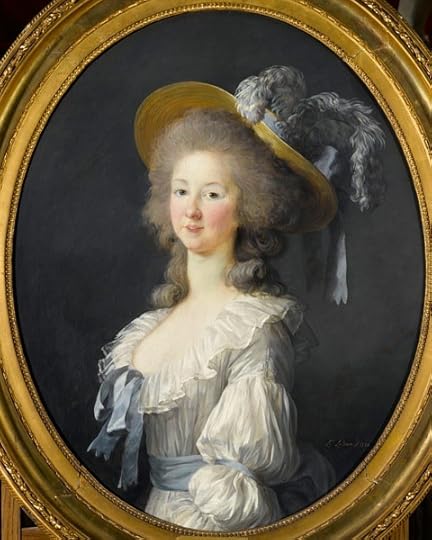
The Princesse de Lamballeby Elisabeth Louise Vigée‐Le Brun
http://www.chateauversailles.fr/les-a...
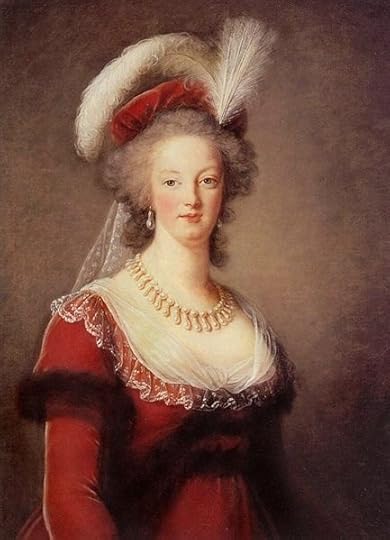
Marie-Antoinette by Elisabeth Louise Vigee-LeBrun
http://www.batguano.com/vigeemagaller...
http://www.gogmsite.net/grand-ladies-...
I like the idea that the artist is a mystery...the painting a copy. The necklace...
Detroit Insitute of the Arts had it at one time.
 Phillida wrote: "On p. 98 (ML) the narrator writes of Saint-Loup's craving to see Morel, despite Morel's bad behavior to him. "I thought it kinder to Gilberte...
Phillida wrote: "On p. 98 (ML) the narrator writes of Saint-Loup's craving to see Morel, despite Morel's bad behavior to him. "I thought it kinder to Gilberte...Have we ever before seen the narrator do a considered, thoughtful kindness to anyone? He has changed."
In one reading group, someone posed the question, "Does reading Proust make you a more compassionate person?"
Maybe the answer is, "Yes," if we subconsciously identify with "Marcel."
Books mentioned in this topic
1913: Der Sommer des Jahrhunderts (other topics)Lettres à sa voisine (other topics)
Lettres à sa voisine (other topics)
Marketing Modernism in Fin-de-Siècle Europe (other topics)
A History of French Passions: Volume 4 - Taste and Corruption (other topics)
More...



